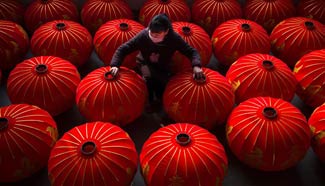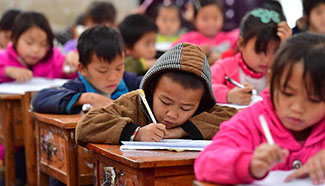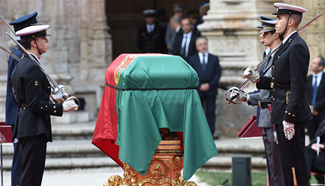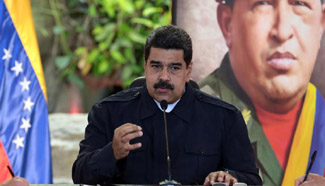BEIJING, Jan. 11 (Xinhua) -- It has become more than clear that China wants to ensure its officials "do not want to be corrupt." But how exactly does a nation go about this? One answer lies in spreading Confucian ideals.
At the beginning of the new year, Jining, the hometown of Confucius and Mencius, in eastern China's Shandong Province was crowded with officials of the Communist Party of China (CPC).
Two years ago the city, long a cradle of Confucian and Mencian culture, started training courses on various aspects of Confucian thought, such as benevolent governance, filial piety, incorrupt governance and abiding by rules,
Although it was cold outside, Zhang Hui gave a lecture on political morality to about 30 local CPC officials, who were standing in the grounds of the Mencius family mansion.
Mencius (372-289 BC), or Meng Zi, was a pupil of Confucius' grandson, and traveled his life teaching Confucianism.
"Mencius' benevolent thoughts presented rules to his descendants on how to become a good man and do good deeds. In ancient times, we had rules for managing a household; now we have rules for governing a Party," said Zhang, who works for the local cultural relics bureau.
Jining has organized 486 training courses for 26,500 people, covering 14 provincial-level regions.
The CPC has always paid attention to educating members on a range of ethical issues, including staying close to the masses, which is important to the development of the Party.
Forgetting honor for profits and perverting justice for bribes are acts spurned in Chinese culture, and the Party wants to ensure this does not change, by appropriately nurturing and selecting CPC officials.
According to an article on recent corruption cases published on the CPC Central Commission for Discipline Inspection (CCDI) website, loosening morality is the root cause of graft.
Zheng Jinzhou, vice president of China Executive Leadership Academy in Pudong, told Xinhua that keeping Chinese culture in their minds would help CPC officials increase their cultural confidence and cultivate upright morality.
Xin Ming, a professor with Party School of the CPC Central Committee, clarified how the rhetoric on anti-corruption was being put into action.
He said that the idea officials "do not dare to be corrupt" was guaranteed by national administration; that officials "cannot be corrupt" was standardized in rules and regulations; and that officials "do not want to be corrupt" focused on officials' inner traits and moral principles.
"The core of establishing a long-term anti-corruption mechanism is to cultivate officials' moral character, rectify minds and improve consciousness," Xin said.
CRACK DOWN ON CORRUPTION
Since the 18th CPC National Congress in 2012, the CPC has stipulated and revised more than 50 intra-Party regulations, and abolished nearly 700 outdated intra-Party documents.
During the same period, 240 centrally administered officials have been investigated for violating government rules, including Zhou Yongkang, Bo Xilai and Ling Jihua.
Over four years, more than 1.16 million corruption cases were filed and nearly 1.2 million people have been punished for violating CPC and government rules.
Since 2014, 2,566 fugitives have been extradited or repatriated, with assets worth about 8.6 billion yuan (1.3 billion U.S. dollars) recovered.
The CCDI has said that the anti-corruption drive would maintain a tough stance on corruption in 2017 and "comprehensive and strict governance of the Party" would go deeper.
According to the communique released after a CCDI session, CPC members should improve their political consciousness and consolidate beliefs based on cultural confidence.











